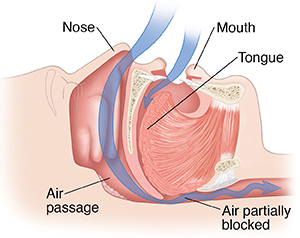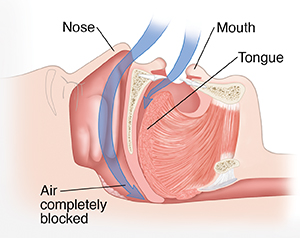What Are Snoring and Sleep Apnea?
What Are Snoring and Obstructive Sleep Apnea?
If you’ve ever had a stuffed-up nose, you know the feeling of trying to breathe through a very narrow passageway. This is what happens in your throat when you snore. While you sleep, structures in your throat partly block your air passage. This makes the passage narrow and hard to breathe through. In some cases the entire passage may become blocked so you can’t breathe at all. Then you have obstructive sleep apnea.
Snoring |
Obstructive sleep apnea |
Snoring
If your throat structures are too large or the muscles relax too much during sleep, the air passage may be partly blocked for a while (temporarily). But over time the air gets past. As air from the nose or mouth passes around this blockage, the throat structures vibrate. This causes the familiar sound of snoring. This sound can be loud. Snorers may wake up others, or even themselves, during the night. Snoring gets worse as more and more of the air passage is blocked.
Obstructive sleep apnea
If the structures partly or completely block the throat, air can’t flow to the lungs at all. This is called hypopnea (decreased breathing) or apnea (meaning “no breathing”). The lungs aren’t getting fresh air. So the brain tells the body to wake up just enough to tighten the muscles and unblock the air passage. With a loud gasp, breathing begins again. This process may be repeated over and over again during the night. This can make your sleep fragmented with lighter stages of sleep. You won’t remember waking up many times during the night. But due to lighter sleep you will feel tired the next day. The lack of sleep and fresh air can also strain your lungs, heart, and other organs. This leads to problems such as high blood pressure, heart attack, or stroke.
Problems in the nose and jaw
Problems in the structure of the nose may block breathing. A crooked (deviated) septum or swollen turbinates can make snoring worse or lead to apnea. Also, a receding jaw may make the tongue sit too far back. Then it’s more likely to block the airway when you’re asleep.
Updated:
December 31, 2017
Sources:
Obstructive Sleep Apnea. American Association of Oral and Maxillofacial Surgeons., Your Guide to Healthy Sleep. National Heart, Lung, and Blood Institute.
Reviewed By:
Blaivas, Allen J., DO,Fraser, Marianne, MSN, RN

